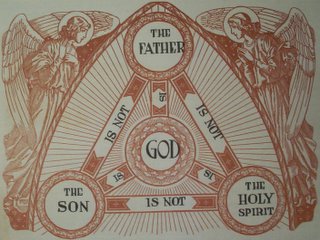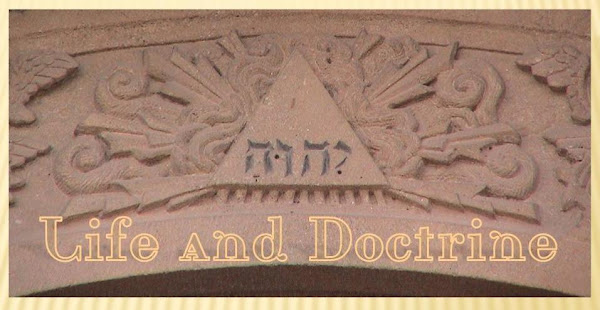
Many teachings on this subject begin by assuring the audience that they will not understand it, they aught not try and it is actually impossible. It seems odd to begin a lesson by assuring the student that they will not understand what they are being taught. The usual qualifier, you can apprehend but not comprehend, is appreciated but seems a bit too open ended and still much to discouraging to someone who is hearing the teaching in order to actually learn the subject. This tactic has also provided fuel for the fires of anti-Trinitarians.
Some people appear quite pleased to think that if they can’t understand it then it must not be true. Worse even, if those who do believe it spend their time talking about how they themselves don’t understand it, and in fact can’t understand it, this makes the situation worse.
So, am I claiming that I can and do fully understand, comprehend and apprehend God’s Triune nature? Wait a moment.
The argument which states that the word Trinity is not in the Bible is sophomoric and yet, unfortunately, still very effective. The simple answer is that the word Bible is not in the Bible either and the word Trinity is not but the concept is. Since the concept is in the Bible we have constructed a formulation. The next issue is that once we express the formulation the skeptic asks, “Where is that found in the Bible?” Strictly, it is not in the Bible, that is to say, the formulation is not in the Bible stated as a formula.
This is the very reason why we have constructed the formulation in the first place—it is a succinct expression of what the Bible does say with regards to God’s Triune nature. We should make this clear lest a skeptic think that it must be that human philosophy of which we are warned in the Bible (Colossians 2:8, see our article Oneness Pentecostalism’s Philosophy), since we have stated a formulation for which we may not be able to provide one book, chapter and verse.
A Biblical explanation of the Trinity will require some time and page turning, if you have the time and they have the patience, fine. If not, offer the formulation and explain that it expresses everything that we do find in the Bible about the Trinity.
So, am I claiming that I know all there is to know about God’s nature? Wait a moment.
Let us reiterate with some explanation: I find it no easier to understand a strict-monotheistic God who is eternal, non-corporeal, omniscient, omnipotent, omnipresent, than to understand a Triune being with the same attributes. Moreover, I believe in many thing that I do not understand: nutrition, computers, gravity, love, etc., etc. Someone may object by stating, “You may not understand computers but there are people who do.”
True, enough but it is still a fact that I do not and yet I believe in utilizing them. Besides, there are many things which no human understands and yet, believe.
Jewish Scholars Claude Montefiore and Herbert Loewe state that one of the “distinctive excellences of the Jewish religion that in it the difference between the religion of the believing philosopher and the religion of the uneducated man is almost bound to be less than the difference between two such persons in Christianity…”
Be that as it may, please note the rest of their statement:
“…This excellence does not by any means prove that Judaism is truer than Christianity. On the contrary, the reverse may be the fact. For the full truth may be more complicated and difficult than the half truth.
The Christian doctrine of the Divine Unity which is also a Trinity all would allow to be more complicated and difficult theory than the Jewish theory of the Unity which is just a Unity. But its complication or difficulty is no valid argument against truth….Without in any way perceiving any weakening thereby of the doctrine of the Unity [of God], the Rabbis are able, if they please, every now and then, to make a distinction, even as the Hebrew Bible occasionally does, between God and the Holy Spirit…
I have not come across any passage which seriously tackles the Christian conception of the Trinity, or which attempts to show that a Unity, which is a simple and pure Unity, is a higher or truer conception of the divine nature than a Unity of a Trinity or than a Trinity in a Unity.”[i]
So, am I claiming that I can and do fully understand God’s Triune nature and why am I discouraging the premise and or preface of stating that we never will so don’t even try? What I am proposing is a very simple tactic and it is as follows: God has revealed His word to us, He has done so in order to express certain things about Himself to us. Thus, what we can know about God is what God has revealed to us about Himself so that we would understand what He wants us to know about Him and His Triune nature. How it can be or why it is are other matters completely.
What if you were to ask me to describe a being who is eternal, non-corporeal, omniscient, omnipotent, omnipresent, who is not subject to the laws of nature nor time. If my answer was that this being is Triune, that it is one being revealed in three persons, that each person is God and yet each one is not the other but they are distinct personages, that each is co-equal, etc. it should not surprise you one bit—God is unlike anything within the human experience.
Yet, still we state that if it has indeed been God’s purpose to reveal His word to us then we aught to proclaim that we believe what we believe based on His word and that we can understand, by utilizing the minds He has designed for us, that which He wants us to know with regards to his nature.
[i] Claude Joseph Goldsmith Montefiore and Herbert Martin James Loewe, A Rabbinic Anthology (Greenwich Edition: Meridian Books, Inc., nd), pp. lii, 7


 Get my ebook, "The Apocryphal Jesus," here
Get my ebook, "The Apocryphal Jesus," here

No comments:
Post a Comment
Note: Only a member of this blog may post a comment.